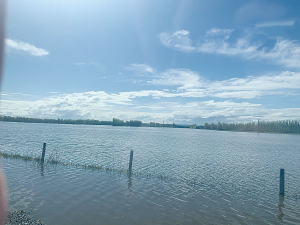NZ Catchment Groups Thrive with ‘Source to Sea’ Approach
The most successful catchment groups in NZ are those that have 'a source to sea' approach.
 MPI is doing a needs assessment, but the Rural Support Trust, along with other agencies, is using its respective networks to double check that all those who need help will get it.
MPI is doing a needs assessment, but the Rural Support Trust, along with other agencies, is using its respective networks to double check that all those who need help will get it.
The chair of the Otago Rural Support Trust, Tom Pinckney, says he believes that they will be especially busy in the coming months as the enormity of the floods hit home.
He says the goal of the trust right now is to ensure that no farmers in need are overlooked.
He says MPI is doing a needs assessment, but the trust, along with other agencies is using its respective networks to double check that all those who need help will get it.
"The trust has had some but not a lot of, direct requests for help, but this isn't surprising, with farmers focused on their immediate need to clear and repair fences and in some cases tracks on their properties," he says.
Pinckney says farmers will also have to re-grass damaged pastures and assess stock losses.
He says some farmers in the worst hit areas may have lost between 10-15% of their lambs.
He says once farmers get their places back to normal and have time to assess what they are faced with, the issue of mental health will start to come to the fore.
He says that's why the trust is expecting the impacts of the floods to play out for some time with all sorts of pressures going on farmers.
Dairy Women's Network (DWN) has announced that Taranaki dairy farmer Nicola Bryant will join its Trust Board as an Associate Trustee.
Rural Women New Zealand (RWNZ) says it welcomes the release of a new report into pay equity.
Red meat exports to key quota markets enjoyed $1.4 billion in tariff savings in the 2024-25 financial year.
Remediation NZ (RNZ) has been fined more than $71,000 for discharging offensive odours described by neighbours as smelling like ‘faecal and pig effluent’ from its compositing site near Uruti in North Taranaki.
Two kiwifruit orchards in the Bay of Plenty and one in Northland are this year's finalists for the Ahuwhenua Trophy competition.
The Government's chief science advisor, Dr John Roche says the key objective for the science sector in the coming year is bedding down the reforms which sees the merger of the previous entities.

OPINION: A mate of yours truly reckons rural Manawatu families are the latest to suffer under what he calls the…
OPINION: If old Winston Peters thinks building trade relations with new nations, such as India, isn't a necessary investment in…